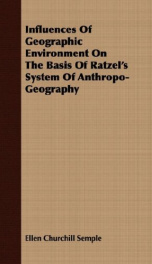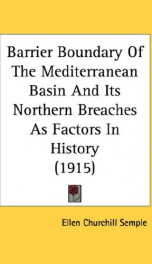Influences of Geographic Environment

INFLUENCES OF GEOGRAPHIC ENVIRONMENT ON THE BASIS OF RATZELS SYSTEM OF ANTHROPO-GEOGRAPHY BY ELLEN CHURCHILL SEMPLE AtmiOlt OJ AMERICAN HIHTOKY AND ITS GEOGRAPHIC CONDITIONS INSTITUTE 8F TOTUW NEW YORK HKNUY HOLT AND X MPANY LONDON CONSTABLE COMPANY LTD COPYRIGHT, 1911, BY HENRY HOLT AND COMPANY TO THE MEMORY OF FR3EDRICH RATZEL Hither, as to their fountain, other stars Repairing, in their golden urns draw light. MILTOW. PREFACE THE present book, as originally planned over seven years ago, was to be a simplified paraphrase or restatement of the principles embodied in Friedrich RatzePs Anthropo-Geog raphie. The German work is difficult reading even for Ger mans. To most English and American students of geogra phic environment it is a closed book, a treasure-house bolted and barred. Ratzel himself realized that any English form could not be a literal translation, but must be adapted to the Anglo-Celtic and especially to the Anglo-American inind. The writer undertook, with RatzePs approval, to make such an adapted restatement of the principles, with a view to making them pass current where they are now unknown. But the initial stages of the work revealed the necessity of a radical modification of the original plan. Ratzel performed the great service of placing anthropo gcography on a secure scientific basis. He had his fore runners in Montesquieu, Alexander von Humboldt, Buckle, Rittcr, Kohl, Peschel and others but he first investigated the subject from the modern scientific point of view, constructed his system according to the principles of evolution, and based his conclusions on world-wide inductions, for which his pre decessors did not command the data. To this task he brought thorough training as a naturalist, broad reading and travel, a profound and original intellect, and amazing fertility of thought. Yet the field which he had chosen was so vast, and its material so complex, that even his big mental grasp could not wholly compass it. His conclusions, therefore, are not al ways exhaustive or final. Moreover, the very fecundity of his ideas often left him no time to test the validity of his principles. He enunciates one brilliant generalization after another. Sometimes he re veals the mind of a seer or poet, throwing out conclusions which are highly suggestive, on the face of them convincing, vi PREFACE but which on examination prove untenable, or at best must be set down as unproven or needing qualification. But these were just the slag from the great furnace of his mind, slag not always worthless. Brilliant and far-reaching as were his conclusions, he did not execute a well-ordered plan. Rather he grew with his work, and his work and its problems grew with him. He took a mountain-top view of things, kept his eyes always on the far horizon, and in the splendid sweep of his scientific conceptions sometimes overlooked the details near at hand. Herein lay his greatness and his limitation. These facts brought the writer face to face with a serious problem. RatzePs work needed to be tested, verified. The only solution was to go over the whole field from the begin ning, making research for the data as from the foundation, and checking off the principles against the facts. This was especially necessary, because it was not always obvious that Ratzel had based his inductions on sufficiently broad data and his published work had been open to the just criticism of inadequate citation of authorities. It was imperative, moreover, that any investigation of geographic environment for the English-speaking world should meet its public well supported both by facts and authorities, because that public had not previously known a Rittcr or a Pcschcl. The writers own investigation revealed the fact that Rat zePs principles of anthropo-geography did not constitute a complete, well-proportioned system...
Info about the book
Author:
Series:
Unknown
ASIN:
B008BCHWPA
Rating:
4.5/5 (1)Your rating:
0/5
Languge:
English
Users who have this book
Users who want this book
What readers are saying
What do you think? Write your own comment on this book!
write a commentGenre
if you like Influences of Geographic Environment try:
Do you want to exchange books? It’s EASY!
Get registered and find other users who want to give their favourite books to good hands!



